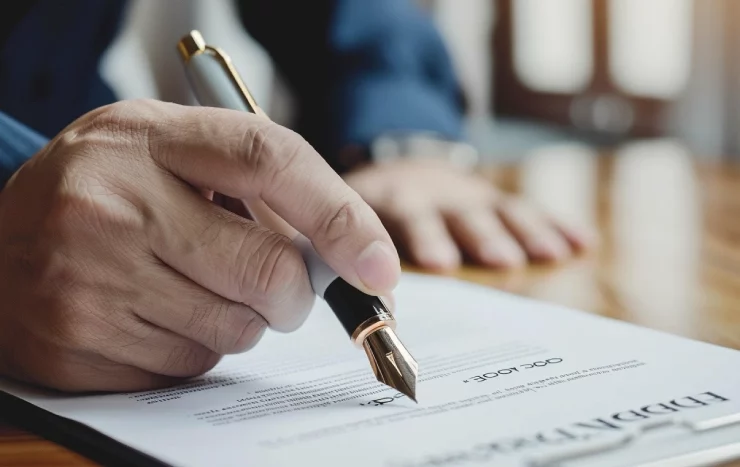Who are the Parties to a Property Management Agreement in Phuket | Identify the Partners
The parties involved in a property management agreement are crucial to its success, each bringing unique responsibilities and expectations. Understanding the roles and obligations of these key players is essential for clarity and smooth operation. But who are the parties to a property management agreement in Phuket?
In a Property Management Agreement, the parties involved are typically the property owner, referred to as the principal, and the property manager, who acts as the general agent.
The property owner, or principal, is the individual or entity that owns the property and is seeking management services. Meanwhile, the property manager is the professional or management company hired to oversee the day-to-day operations and responsibilities related to the property.
In today’s article, we will discuss why property management agreements are important and why you need one. So keep reading to find more.
What is the Importance of a Property Management Agreement?
When entering a Property Management Agreement, understand the following importance of such a document:
- Clear definition of roles and responsibilities
- Protection of interests and assets
- Clarity on financial arrangements
- Establishment of termination procedures
- Promotion of effective communication and conflict resolution
1. Clear Definition of Roles and Responsibilities
A Phuket property management agreement clearly outlines the roles of the property owner and the management company and their responsibilities. This agreement serves as a detailed roadmap, specifying tasks such as rent collection, tenant screening, property maintenance, and financial management.
By clearly defining these roles upfront, misunderstandings can be minimized, and each party can comprehend their obligations accurately. Property owners can trust the property management company to handle specific tasks efficiently, while the management company understands its responsibilities.
2. Protection of Interests and Assets
This agreement is crucial in establishing guidelines for managing the property and addressing potential risks during the partnership. By clearly outlining responsibilities and obligations regarding insurance coverage and liability limits, the agreement helps mitigate disputes and uncertainties.
Moreover, including indemnification clauses offers additional security by allocating responsibilities in case of unforeseen events. As a result, the detailed provisions in the agreement help safeguard the property owner’s and management company’s interests and assets.
3. Clarity on Financial Arrangements
Financial clarity is essential to a Property Management Agreement, underscoring its importance in establishing clear terms for fees and compensation structures. The agreement minimizes confusion and mitigates potential payment disputes by detailing the financial considerations upfront.
Property owners benefit from a transparent understanding of their financial obligations, ensuring they know precisely what they charge for. Simultaneously, management companies can guarantee fair compensation for the services they provide.
This clarity in financial arrangements fosters trust between parties and sets a solid foundation for a mutually beneficial relationship throughout the property management term.
4. Establishment of Termination Procedures
Establishing clear termination procedures in a Phuket property management agreement ensures a smooth and well-defined process for ending or changing the contract. These procedures outline the conditions under which either party can terminate the agreement, offering clarity and assurance to all involved.
Proactively addressing the agreement’s termination or management changing process can mitigate potential ambiguities and conflicts. In either case, having well-defined termination procedures makes the transition easier and less contentious for both parties.
5. Promotion of Effective Communication and Conflict Resolution
Effective communication and conflict resolution mechanisms are crucial in highlighting the significance of a property management agreement. These aspects ensure a smooth relationship between property owners and management companies.
Clear communication protocols set expectations and provide interaction guidelines. Dispute resolution mechanisms prevent minor issues from escalating. By promoting open channels, the agreement establishes transparency and collaboration.
Will I need a property management contract or agreement?
To ensure the smooth management of your property, a property management contract or agreement will be necessary between you, as the property owner, and the appointed property manager or management company.
This contract is a fundamental requirement in property management, delineating the responsibilities of the manager and the owner’s responsibility. Both parties can clearly understand their roles and obligations through a contract, reducing the chances of misunderstandings.
What occurs after a property manager signs a management agreement with an owner?
Upon signing a property management agreement between the property manager and the owner, the property manager assumes the role of an authorized representative with defined responsibilities. In this agreement, the property manager is given authority to manage the property on behalf of the owner.
Property managers are responsible for rent collection, maintenance and housekeeping, tenant communication, and financial reporting. The agreement also outlines the owner’s expectations regarding the property’s upkeep, financial performance, and overall management.
What does a management agreement typically include?
A standard Phuket property management agreement typically outlines the duration of the contract, specifying the start and end dates. A management agreement also specifies the fee structure, whether a flat fee or a percentage of the rental income is due to the company.
The agreement will specify the scope of services the management company provides. Additionally, it might explain who’s responsible for what, like a property owner must maintain the property, and a management company must act in the owner’s best interests.
How long does a property management contract last?
The typical duration for a property management agreement generally ranges between one to five years, depending on what the parties want. The time frame defines the parameters for providing property management services and outlines the responsibilities of the property owner and management company.
Both parties must protect their interests adequately, and the management services align with the property’s goals and needs. To provide flexibility and clarity, parties can also include renewal or termination provisions in contracts under certain circumstances.
Indispensable Role of a Property Management Agreement
The parties to a property management agreement typically include the property owner and the property management company. This agreement is crucial for outlining the responsibilities and expectations of both parties, ensuring smooth and efficient property management.
Disputes and misunderstandings may arise without a proper property management agreement, leading to potential legal complications. Therefore, it’s imperative to have a well-drafted and comprehensive agreement in place to protect the interests of all parties involved.









I don’t think the title of your article matches the content lol. Just kidding, mainly because I had some doubts after reading the article.
I’m really impressed along with your writing talents as neatly as with the layout on your blog. Is this a paid subject matter or did you modify it your self? Either way stay up the nice high quality writing, it is rare to see a nice weblog like this one today!
Your point of view caught my eye and was very interesting. Thanks. I have a question for you.